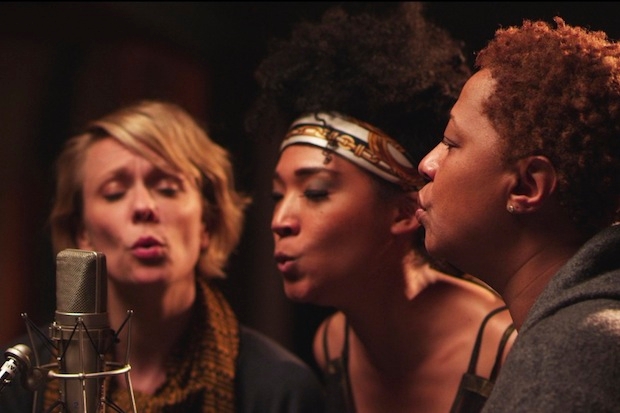Have you ever looked at backing singers and thought: what is their story? Do they or have they ever prayed for their time to come? As they are going ‘ooh ooh, ooh ooh’ behind Kylie are they thinking, ‘I want to kill Kylie’? Do they mind that no one knows their name? Do they ever ponder why it’s so often white artists with black backing singers and never the other way round? I have often wondered about all this, and now realise if I’d stopped idling over such questions, got off the sofa and done some digging, I could now be in possession of an Oscar. I’m a fool to myself; I truly am.
So I did nothing, and cleared the way for Twenty Feet from Stardom, which did get off the sofa, and did dig around, and did win the best documentary Oscar — that is, my Oscar — but I’ve decided: no hard feelings, because it’s just such a wonderful film and, get this, actually feels too short at 96 minutes. When have I ever said that before? Almost never, that’s when. I even sat through to the end of the credits, which is something I never normally do, as I wanted to stay with the sound-track as long as I could. The soundtrack is bliss. The soundtrack will make your spine tingle. The soundtrack will ensure you never listen to the Rolling Stones’ ‘Gimme Shelter’ in the same way ever again. Or ‘Young Americans’. Or ‘Walk on the Wild Side’. And yet the soundtrack may even be the least of it. Yes, it will resonate, and you’ll probably come away with an earworm — I came away with ‘Da Doo Ron Ron’ as my earworm — but it’s the extraordinary women, and their stories, that will resonate the most.
The film’s format is not revolutionary. Far from it. It’s the standard music-doc format. It’s talking heads teamed with vintage footage, which would probably be enjoyable in and of itself. Who doesn’t want to see a then unknown Luther Vandross backing up Bowie on ‘Young Americans’? (‘Sweats like a pig, voice of an angel’, someone will later say of Luther.) But, as directed by Morgan Neville, who obviously adores these women, it’s their hopes and disappointments, triumphs and heartbreaks and fabulous, passionate personalities that takes this film to another level, and will take you with it.
There’s Darlene Love (Sam Cooke, Presley, Frank Sinatra, Sonny and Cher), who started out with the backing group The Blossoms in the Sixties — now all in their seventies, they were reunited for this film; cue first lump in throat — and was then ripped off by Phil Spector, who stole her voice, literally. There’s Merry Clayton (Carole King, Joe Cocker, Tom Jones, Ray Charles), who was roused in the middle of the night in 1969 to race to a recording studio and put her voice to the Stones’ ‘Gimme Shelter’. She laid down the track while wearing pyjamas and hair curlers. Neville plays Mick Jagger an isolated portion of the 40-year recording, featuring only Merry’s mind-blowing, electrifying voice — ‘rape, murder…it’s just a shot away’ — and Jagger is stunned all over again. Jagger is one of the ‘stars’ who talks about the vital work these singers do, as are Bruce Springsteen, Stevie Wonder and Sting, although they are all rather marginalised (ha ha!).
Interestingly, most of these singers began as kids in church choirs. This is why they tend to be black, because they are used to responding to the call of the preacher, as part of the congregation, where the goal was to blend in and not hog the limelight. Or, as someone in the film puts it: ‘It’s the secularisation of gospel.’ Or, as someone else points out, it’s no coincidence that Lou Reed sang: ‘And the coloured girls go: “Doo do doo do doo do do doo…”’ Some did make a bid for solo stardom, and the film is especially fascinating when it explores that juncture where talent meets opportunity and something happens. Or it doesn’t. Merry produced three albums but they just failed to take off, no one knows why. And there’s also Lisa Fischer (Tina Turner, Roberta Flack, Sting, Rolling Stones), whose voice inspires awe in just about everybody, and who released a Grammy-winning first album, but then never produced a second. She just didn’t want it; just didn’t have the necessary ego and narcissism. ‘Some people will do anything to be famous,’ she says, ‘while others just want to sing.’
The film answers all my questions, but also raises some that aren’t addressed. Why are backing singers predominantly female? How does it feel in those rare instances when the tables are turned? (I was dying to hear from one of Gladys Knights’ Pips). How do these women feel propping up white artists who want more of a ‘black’ sound? But these are quibbles, silly quibbles, as it’s just so great otherwise. It’s moving and poignant, introduces us to the women we’ve always heard, but never heard from, and it has that killer soundtrack. It’s got it all, including my Oscar, but I can live with that.






Comments